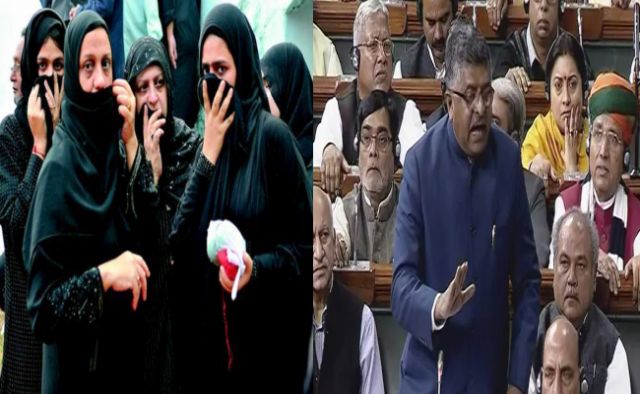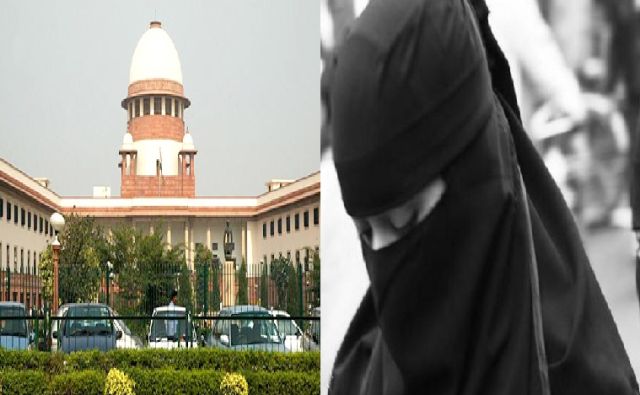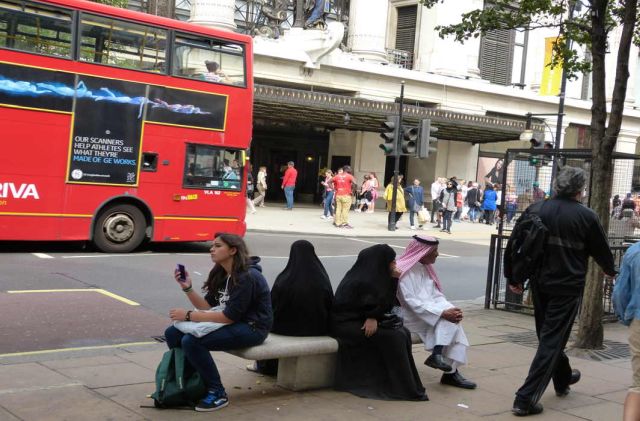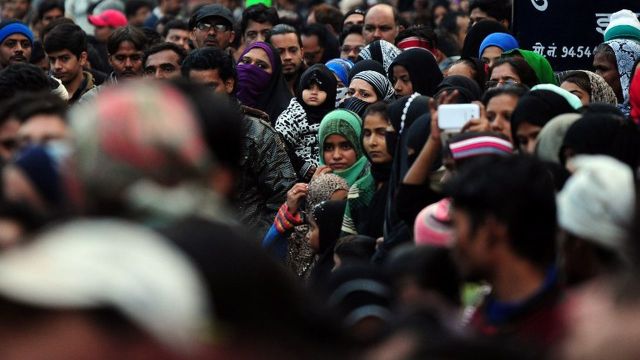
by Editor | May 25, 2021 | News, Politics
 New Delhi : The Muslim Women (Protection of Rights on Marriage) Bill, 2018, commonly known as the Triple Talaq Bill, was introduced in the Lok Sabha on Monday despite opposition from the Congress and amid protests over the Rafale controversy.
New Delhi : The Muslim Women (Protection of Rights on Marriage) Bill, 2018, commonly known as the Triple Talaq Bill, was introduced in the Lok Sabha on Monday despite opposition from the Congress and amid protests over the Rafale controversy.
Union Law Minister Ravi Shankar Prasad introduced the bill amid ruckus created by opposition members including the Congress, AIADMK and TDP over various demands.
Soon after the House reassembled at noon after the first adjournment, the Congress, the AIADMK and TDP members trooped near the Speaker’s podium and started sloganeering.
The Congress members were demanding a Joint Parliamentary Committee (JPC) probe into the Rafale jet fighter deal with France while the AIADMK members wanted Karnataka to take back its proposal to construct a dam across the Cauvery river at Mekadatu.
The TDP members raised several issues related to special status to Andhra Pradesh.
Amid the din, Minister Prasad sought permission from the Chair to introduce the bill.
Congress member Shashi Tharoor opposed the bill claiming it was targeted at a particular religion and hence unconstitutional.
“The bill was based on the ground of a specific religion and it was violation of sections 14 and 21 of the Constitution. This is a misconceived bill,” he said.
His objections were rejected by Prasad.
“The bill was brought in as per the direction of the Supreme Court to protect the rights of Muslim women. Several Muslim women suffered due to instant talaq. This bill is in the nation’s interest and constitutional. The objection is baseless,” Prasad said and then introduced the bill.
The government could not pass the bill in Rajya Sabha during the previous monsoon session.
Later it issued an ordinance on September 19 in making Triple Talaq a criminal offence.
—IANS

by Editor | May 25, 2021 | News, Politics
 New Delhi : The Delhi High Court on Monday asked the Centre and the Delhi government to respond to a plea seeking directions to allow the entry of women into the sanctum sanctorum of the Hazrat Nizamuddin Dargah.
New Delhi : The Delhi High Court on Monday asked the Centre and the Delhi government to respond to a plea seeking directions to allow the entry of women into the sanctum sanctorum of the Hazrat Nizamuddin Dargah.
The court was hearing a plea seeking directions for framing of guidelines to ensure the entry of women and declare the act of prohibiting women to enter as unconstitutional.
A bench of Chief Justice Rajendra Menon and Justice Kameswar Rao asked the Ministries of Home Affairs, Law and Justice, the Delhi government, Delhi Police and Hazrat Nizamuddin Aulia Trust to file the response and listed the matter for further hearing to April 11, 2019.
The plea was filed by Deeba Faryal and other female law students of the Balaji Law College, Pune, who are presently in Delhi for their internship.
The petitioners, in the plea, stated that they had gone to visit the Dargah but they were prohibited from entering the sanctum sanctorum.
“They (law students) found out that women are not allowed inside the main Darghah or the sanctum sanctorum. All the women were allowed to do was to watch from outside how men were praying inside,” said the plea filed by advocate Kamlesh Kumar Mishra.
“While the entire nation is professing and advocating the entry of women in all religious institutions without any discrimination and the same having been further allowed and promoted by the Supreme Court in the recent Sabarimala judgement, women in the heart of the country and the centre of the capital are being discriminated. Their entry into the Dargah of Hazrat Nizamuddin is prohibited when it is just 15 minutes away from the Supreme Court and the Delhi High Court,” read the plea.
The plea has also sought the removal of signs and display boards inside or near the Dargah displaying prohibition of entry of women.
—IANS

by Editor | May 25, 2021 | News, Politics
 New Delhi : The Samastha Kerala Jamiathul Ulema on Tuesday moved the Supreme Court challenging the Muslim Women (Protection of Rights on Marriage) Ordinance, 2018 on the grounds that it invokes penal provisions against a class of people based on their religious identity.
New Delhi : The Samastha Kerala Jamiathul Ulema on Tuesday moved the Supreme Court challenging the Muslim Women (Protection of Rights on Marriage) Ordinance, 2018 on the grounds that it invokes penal provisions against a class of people based on their religious identity.
The Muslim Women (Protection of Rights on Marriage) Ordinance, 2018 — commonly referred to as triple talaq ordinance — abolishes the practice of triple talaq and makes its punishable.
Founded in 1925, the Samastha Kerala Jamiathul Ulema ia a religious organisation of the Sunni Muslim scholars and clerics in Kerala.
Contending that the triple talaq ordinance is violative of Article 14, 15 and 21 of the Indian Constitution, the petitioner organisation has said that it has national ramification as it has introduced penal provision punishing a class of persons based on religious identity.
The Jamiathul Ulema has contended that the ordinance is “causative of grave public mischief, which, if unchecked, may lead to polarisation and disharmony in society”.
The petitioner organisation has taken exception to the word “unabated” in the ordinance, which says that despite the Supreme Court holding the practice of triple talaq (talaq-e-biddat) as unconstitutional, it is continuing “unabated”.
Describing the use of word “unabated” as “entirely whimsical”, the petitioner organisation termed it “misleading, inept and improper”.
It said that it is doubtful that anybody, including the Central government, has any idea of all-India statics on the occurrence of triple talaq across te country prior to the Supreme Court judgment.
It has contended the fact that the matter is pending before the Rajya Sabha is “reason to await the outcome of the matter, not basis to accelerate its coming into force by an emergency ordinance”.
The petitioner organisation have contended that the real thrust of the ordinance is not abolition of triple talaq but punishment of Muslim husbands.
Section 4 of the ordinance imposes a maximum sentence of three-year imprisonment when a Muslim husband pronounces triple talaq. The offence is also cognizable and non-bailable as per Section 7.
“Creation of an offence may be the prerogative of the legislature. The government is duty-bound to act reasonably and sensibly, not merely in administrative matters but also in sovereign matters,” says the petition, contending that to its knowledge, “there is no informed assessment or study that forms basis for the Central government to have created this offence”.
“Some isolated instances of the practice that have occurred after the top court judgment does not imply that a penal provision is required to be immediately enacted to prevent the practice,” the petition has contended.
Having said this, the petitioner Samastha Kerala Jamiathul Ulema has contended that the ordinance under challenge is “patently unconstitutional and has immediate propensity to deprive Muslim men and women of their fundamental rights enshrined under Articles 14, 15 and 21 of the Constitution”.
—IANS

by Editor | May 25, 2021 | Opinions
 By Saeed Naqvi,
By Saeed Naqvi,
In normal times Britain’s former Foreign Secretary Boris Johnson’s observation that burqa-clad women resemble walking “letter boxes” and “bank robbers” would evoke laughter. But these are not normal times.
Just when liberals were beginning to pelt stones at him, a startling turn to the debate was given by Taj Hargay, Imam of Oxford. “The burqa is a Wahabi fifth column… We will wake up in the Islamic Republic of Britain.”
Johnson’s observation is mischievous, and has a political purpose, the Imam’s an exaggeration. The observations are troubling for an Indian Muslim.
I would avoid being judgemental on a community which has been under immense pressure because of rampaging Islamophobia since the 1990s. And yet, I cannot help asking: Is the burqa a response to nasty Islamophobia or a means of aggravating it?
Aggravation of the problem is surely not our purpose. Then whose purpose is served by Muslim women floating around Oxford Circus in gear which distances them, in geometrical progression, from the host population? The clerics, eager to consolidate their congregations? Wouldn’t it be wonderful if these congregations had in their midst scholars, doctors, writers, scientists, entrepreneurs, rather than pliant women fitting Boris Johnson’s description.
I am troubled for another reason. After extensive travel around the world, I am inclined to cast my vote in recent years for Britain as a society where human rights, rule of law, race relations are most secure. That is why I am uneasy at the two observations.
Let me turn to India to bring out my point, by comparison, in bolder relief.
The depths to which Hindu-Muslim relations have sunk in India is attributed by pundits to the brazenly communal politics of the ruling Bharatiya Janata Party (BJP) under Prime Minister Narendra Modi since 2014. If an ancient civilisation, embracing 1.25 billion people, can be so totally transformed in merely four years, Modi and his cohorts deserve to be celebrated as miracle men.
No, the present government has clearly accelerated the communal agenda but the ground for it was diligently laid over 71 years of independence. The ruling party for most of these decades was the Congress.
Social disharmony was built into the manner in which India’s Partition was affected. The Congress was firmly opposed to the two-nation theory enunciated by Mohammad Ali Jinnah, founder of Pakistan — that Hindus and Muslims constituted two separate nations. But the Congress accepted Lord Mountbatten’s June 3, 1947, plan for Partition in double-quick time.
Maulana Abul Kalam Azad, former President of the Congress, and others warned Pandit Nehru that Partition would mean “unadulterated Hindu Raj”.
By that logic, once the Congress Working Committee had accepted a Muslim state, with a small Hindu minority, named Pakistan, it logically followed that the rest of India would be Hindustan or a Hindu state with a substantial Muslim minority. In other words, on August 15, 1947, India glided seamlessly from British Raj to Hindu Raj but Nehru chose not to use the term “Hindu” for a variety of reasons.
A “Hindu” state was an affront to his self-image. Self-image was important to Nehru. In his evolution, there was a phase when he was angry with his father for having hired an English governess for his sister, Vijaylakshmi Pandit. “Bhai (brother) was cross,” Mrs. Pandit told me, “because British aristocracy those days preferred French governesses.”
The basic reason why Nehru avoided the term “Hindu” to describe the new found state was Kashmir. How could a Hindu state claim the Muslim majority province of Kashmir on the principle of contiguity?
Look at it from the hardcore Hindu perspective. After a thousand years of Muslim rule, 200 of British, the Muslim state of Pakistan does come into being. But, alas, no Hindu state. The sophistry of why it is so is lost on the millions. This is where the Hindu communalist pitches his tent.
It turns out that, over the decades, a compulsive hatred for Pakistan has emerged an acid test for nationalism. Into this bubbling cauldron has been pushed a boulder — the post-9/11 war against terror. The Islamophobia this has generated globally has been grist to the Hindu communalist’s mill too.
I have argued in my book “Being The Other: The Muslim in India” that calling a spade a spade at the very outset would have minimised the social disharmony that has plagued us for 71 years. From day one we should have declared ourselves a Hindu state. This would have obviated the need for an unsettling, double-distilled Hindu Rashtra or Hindu Nation. The Hindu in this “raj” would have been at the steering wheel but the minorities would have struck a stronger bargain for education, seats in Parliament, jobs in the cabinet, Civil Service, Police, Armed Forces and so on.
Detractors raise a howl of protest. How can a theoretic state be secular?
In the recent elections in Pakistan, three Hindus — Mahesh Malani, Hari Ram Kishwari Lal and Giyan Chand Essrani — won from general seats in Sind, one for the National Assembly and two for the Provincial Assembly.
The fact that Britain is a Protestant monarchy did not come in the way of Sadiq Khan serving as London’s high profile Mayor. Last year Donald Trump banned travel to the US from several Muslim countries. He was therefore not accorded a “state” visit to Britain because in that event protocol would have involved the Mayor of London. Saving Sadiq Khan this embarrassment was important enough for the organisers to deny Trump a state banquet with the Queen.
The Home Secretary Sajid Javid may not be a practicing Muslim but he is there high in public profile to make a bid for the top job. Two years ago when I watched a Test match there were four Muslims in the English cricket team. I have met doctors, teachers, civil servants, entrepreneurs from the subcontinent, both Hindus and Muslims, thriving. The Anglican Church never came in their way. In India’s circumstances in 1947, a Hindu India may have been better, than the one cloaked in a hollow and bogus secularism where the police watch on as one Muslim (or Dalit) after another is lynched, some to the accompaniment of expert photography.
(A senior commentator on political and diplomatic affairs, Saeed Naqvi can be reached on saeednaqvi@hotmail.com. The views expressed are personal.)
—IANS

by Editor | May 25, 2021 | News, Politics
 New Delhi : The government on Saturday accused the Congress, its President Rahul Gandhi and UPA Chairperson Sonia Gandhi of betraying Muslim women by thwarting the passage of the triple talaq bill in the Rajya Sabha, and appealed to women organisations across the country to start a peaceful agitation against the Opposition to create moral pressure to pass the law.
New Delhi : The government on Saturday accused the Congress, its President Rahul Gandhi and UPA Chairperson Sonia Gandhi of betraying Muslim women by thwarting the passage of the triple talaq bill in the Rajya Sabha, and appealed to women organisations across the country to start a peaceful agitation against the Opposition to create moral pressure to pass the law.
Addressing a press conference at the just-concluded monsoon session of Parliament, Parliamentary Affairs Minister Ananth Kumar said: “The government did three amendments in triple talaq bill. The question is why Congress, Rahul Gandhiji and Soniaji are trying to thwart the bill. Why are they trying to create obstacles?. By thwarting triple talaq bill, they betrayed our Muslim sisters”.
Raising questions over the conduct of the Congress and other opposition parties, he asked “when the bill was passed unanimously in Lok Sabha, then why are they trying to create hurdles in Rajya Sabha repeatedly”.
“I think, all the women organisations, the organisations who work for gender justice and crores of Muslim sisters should start a peaceful and non-violent agitation. They should create a moral pressure on Rahul Gandhi, Sonia Gandhi and other opposition (leaders) so that the triple talaq law could be passed expeditiously and the victim women could get protection,” Kumar said.
Referring to the amendments brought by the government in the bill, Kumar said only the victim woman and her blood relative can complain, the bail provision will be decided by the magistrate only after hearing the victim and the compensation will be decided by the court.
Talking about the session, he said the “most important thing of the session was that the no-confidence motion was defeated and the opposition was given a befitting reply that BJP, NDA and NDA+ are united. This was also proved with the election of Rajya Sabha Deputy Chairman.”
His deputy Vijay Goel also accused the Opposition of consciously creating difficulties in passing the triple talaq bill.
“We (Rajya Sabha) passed 14 bills in this session, including six ordinances. The triple talaq bill would have been passed if the Opposition had not created hurdles intentionally. The Opposition passed the bill in Lok Sabha but despite the amendments in it, they did not allow passage of it in Rajya Sabha,” he said.
Goel further said the session of Parliament was productive for the government with 21 bills passed by the Lok Sabha and 14 by the Rajya Sabha.
Calling it a “social justice” session, Goel said a social justice fortnight will be celebrated from August 15-30 to mark the passage of the bill giving constitutional status to the National Commission for Backward Classes and the SC-ST (Prevention of Atrocities) bill.
Goel said all the ministers will approach people in their homes in their constituencies and inform them about the bills passed by the government.
“The programme will be celebrated every year between August 1 and 9,” he added.
—IANS

 New Delhi : The Muslim Women (Protection of Rights on Marriage) Bill, 2018, commonly known as the Triple Talaq Bill, was introduced in the Lok Sabha on Monday despite opposition from the Congress and amid protests over the Rafale controversy.
New Delhi : The Muslim Women (Protection of Rights on Marriage) Bill, 2018, commonly known as the Triple Talaq Bill, was introduced in the Lok Sabha on Monday despite opposition from the Congress and amid protests over the Rafale controversy.



